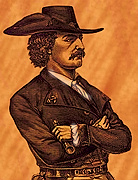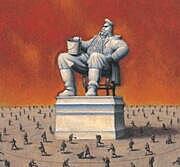|
Xander77 posted:Anything good on Troskyist thought? I'm currently reading "My Life" and it's kinda terrible as an autobiography of a political figure and in terms of explaining what he was all about. I think this Trotsky fellow protests too much https://youtu.be/hTIh_J75B3c And no, there despite being over represented in the arts and academics, there isn't much writing by Trots that holds up, its not an exaggeration that the majority of the stuff writing by them is aimed at their own party membership. I think Nigel Harris's work on the Chinese Revolution Mandate of Heaven holds up, but the explicitly Trotskyist parts, which all boil down to variations on "Mao sucks when compared to the Bolsheviks before Stalin" are still the weakest parts. Well, I'd also recommend CLR James work on the Haitian revolution, the famous Black Jacobins, its worth reading, but CLR James was only briefly associated with Trotskyism before moving away from it.
|
|
|
|

|
| # ? Apr 16, 2024 10:08 |
|
The North Tower posted:Chomsky was a little late to the ‘Cambodian genocide really happened and it was worse than we thought’ party, but when there was enough evidence he did change his mind. The figures he endorses in Manufacturing Consent 6.2.2 (1988) are 600-750,000 dead due to the Khmer Rouge, which is rather late to the party... He seems to be very touchy about admitting that he was wrong, but definitely doesn't deny it. Anyway, it's a single stain on an interesting book, although on thinking about it some more they push the propaganda model a bit far.
|
|
|
|
Safety Biscuits posted:The figures he endorses in Manufacturing Consent 6.2.2 (1988) are 600-750,000 dead due to the Khmer Rouge, which is rather late to the party... He seems to be very touchy about admitting that he was wrong, but definitely doesn't deny it. Anyway, it's a single stain on an interesting book, although on thinking about it some more they push the propaganda model a bit far. Yeah I think I picked it up in After the Cataclysm, where he’s questioning who we’re getting reports from and how there’s a potential incentive to play up the misdeeds of ‘those guys’ while our guys get free passes so regularly, but he was writing at the time or within a couple years of the events, so I’m willing to give him the benefit of the doubt. Chomsky has shown no evidence that he’d be for the systematic murder of 1/4-1/3 of Cambodia if he had god-vision at the time of writing. Sort of a boy-who-cried-wolf situation with the establishment being the boy.
|
|
|
|
Safety Biscuits posted:The figures he endorses in Manufacturing Consent 6.2.2 (1988) are 600-750,000 dead due to the Khmer Rouge, which is rather late to the party... He seems to be very touchy about admitting that he was wrong, but definitely doesn't deny it. Anyway, it's a single stain on an interesting book, although on thinking about it some more they push the propaganda model a bit far. While on the lower end of most estimates, those figures aren't ridiculous in terms of the academic literature on the topic - they're pretty similar to the figures Michael Vickery gives in 'Cambodia 1975-1982' (though note that he does so while also saying that he doesn't think it's actually possible to give a reliable estimate because there simply isn't any data for Cambodia's population in 1975). I think some of the recent archaeological work on mass grave sites may have enabled the calculation of more accurate figures although I'm not sure really. Vickery also points out that initial media coverage of the country was slanted and wrong, in the sense that they reported mass killings and atrocities in every part of the country from the moment the CPK took power, when in fact mass killings only really got going on a wide scale in 1976 and particularly in 1977 as the state began to collapse because of different factions in the party basically waging open war against each other, and the extent of mass killings varied by area depending on factors like the disposition of the cadres in the area and the factions they were associated with. So the media reports were slanted towards American interests even though significant aspects of what they were saying was true, or became true. The US media also mysteriously stopped saying anything bad about Pol Pot after he was ousted from power and became a US backed contra, at the same time as there were some genuinely ridiculous stories of Vietnamese atrocities in the country in the 80s, which I think gives you an idea of what was motivating their reporting.
|
|
|
|
A human heart posted:While on the lower end of most estimates, those figures aren't ridiculous in terms of the academic literature on the topic - they're pretty similar to the figures Michael Vickery gives in 'Cambodia 1975-1982' (though note that he does so while also saying that he doesn't think it's actually possible to give a reliable estimate because there simply isn't any data for Cambodia's population in 1975). I think some of the recent archaeological work on mass grave sites may have enabled the calculation of more accurate figures although I'm not sure really. Vickery also points out that initial media coverage of the country was slanted and wrong, in the sense that they reported mass killings and atrocities in every part of the country from the moment the CPK took power, when in fact mass killings only really got going on a wide scale in 1976 and particularly in 1977 as the state began to collapse because of different factions in the party basically waging open war against each other, and the extent of mass killings varied by area depending on factors like the disposition of the cadres in the area and the factions they were associated with. So the media reports were slanted towards American interests even though significant aspects of what they were saying was true, or became true. The US media also mysteriously stopped saying anything bad about Pol Pot after he was ousted from power and became a US backed contra, at the same time as there were some genuinely ridiculous stories of Vietnamese atrocities in the country in the 80s, which I think gives you an idea of what was motivating their reporting. The last part I think really hit Chomsky, as it turns out that the Communist reprisals against Vietnamese pro-Capitalists never really happened to the degree they were expected/?hoped for? by Western anti-Communists.
|
|
|
|
gfarrell80 posted:Under my belt, which I would 2nd the recommendation for: With Chris Hedges, do American Fascists: The Christian Right and the war on America. It details the Dominion and right-wing Christian movements since WWII and the Civil Rights movement, and how they completely consolidated control over the Republican and even the Democratic parties. The OP mentioned Capital and Wage Labor as a short, accessible introduction to Marx’s work by himself, and I would add Value, Price, and Profit to that.
|
|
|
|
An excellent book to read on the history of the communist parties of South East Asia and why they very quickly fell into vicious infighting is Red Brotherhood At War: Vietnam, Cambodia and Laos since 1975, by Grant Evans and Kevin Rowley (latest edition preferred). It looks at the histories of the three communist parties, and also the PRC and Thai Communist party, examines their nationalism and power plays and the response from the wider region and global community. When it was published it was denounced as pro-Vietnam propaganda by supporters of Pol Pot and the People's Republic, and denounced by supporters of Vietnam for being pro Cambodian and pro Chinese, to give an idea of how hard hitting its information was.
|
|
|
|
gfarrell80 posted:Under my belt, which I would 2nd the recommendation for: Sausage party
|
|
|
|
Having not really read Marx until recently man I was not aware how much he did not like Jews. I guess he's saying it's just the "everday" Jew but still. Acerbatus fucked around with this message at 03:29 on Sep 17, 2020 |
|
|
|
just assume that any european up until the 1940s was an antisemite until proven otherwise or unless the person was jewish themselves
|
|
|
|
actually, you could probably stretch that timeframe up until somewhere between the 80s and present day
|
|
|
|
Baka-nin posted:I think this Trotsky fellow protests too much https://youtu.be/hTIh_J75B3c Anyway - I don't know what kind of protests Trotsky made in the 30's, but at the end of the 20's he had a fairly established position - soviets and soldier committees were of course perfectly good when fighting against the Tzarist dictatorship \ "the democrats", but were definitely bad when holding back the worker's dictatorship. Simple as could be (one of the reasons why I wish he would bother to explain his politics even the tiniest bit, instead of assuming everyone are familiar with the minute aspects and focusing his efforts on vicious personal attacks with no meaningful practical examples). quote:And no, there despite being over represented in the arts and academics, there isn't much writing by Trots that holds up, its not an exaggeration that the majority of the stuff writing by them is aimed at their own party membership.
|
|
|
|
Mate its an audiobook and was the first thing that came up when I searched the title. Lenin didn't have a "golden boy" and the Bolsheviks were not an "Iron disciplined" collective either those are two common myths. Virtually every leading Bolshevik had very open and quite severe disagreements with Lenin, except for Stalin, because once Lenin had made his views clear Stalin usually switched sides. Trotsky was no exception and he hadn't openly joined the Bolsheviks until August 1917 either. I don't believe I've ever come across someone claiming he was a great propagandist before; Trots lauding him as an excellent theorist sure, but never a great speaker to the masses. Besides looking at how few supporters he had during the fight for the leadership after Lenin died I don't think its particularly credible. Even the army and the secret police didn't lift a finger to save him, even though most of the officers owed their jobs to him. Usually its Bukharin that gets the credit for being their greatest spinner. Yugoslav Communist(at the time) Ante Ciliga's account of his time in the Soviet prison system involves him meeting genuine Trotsky supporters in the gulags, they were always few in number, dwarfed by every other current of left wing prisoner population and many seemed to believe they would soon be released once the pro Trotsky NKVD launched a coup, and put them back in charge, so they could treat the Stalinites and the rest of the deviationists just like they had been treated. https://libcom.org/library/russian-enigma-ante-ciliga
|
|
|
|
Baka-nin posted:I don't believe I've ever come across someone claiming he was a great propagandist before; Trots lauding him as an excellent theorist sure, but never a great speaker to the masses.
|
|
|
|
Malkina_ posted:With Chris Hedges, do American Fascists: The Christian Right and the war on America. It details the Dominion and right-wing Christian movements since WWII and the Civil Rights movement, and how they completely consolidated control over the Republican and even the Democratic parties. Thanks for the recommendation, excellent.
|
|
|
|
cda posted:Sausage party I should have also included: Jane Jacobs, The Death and Life of the Great American Cities (1961). Absolutely brilliant book. Gets into not just cities, but the whole power structure of society, and she saw the growing corporate influence wiggling its way in. I first read it well over 10 years ago but I still remember parts of it very strongly and it is still deeply relevant. I see Jane Jacobs has written several more books. Has anybody here read any of them? "Dark Age Ahead" and "Systems of Survival" sound interesting... but like Chris Hedge's stuff... I don't want to get too horribly depressed.
|
|
|
|
gfarrell80 posted:Thanks for the recommendation, excellent. I forgot to add Marx’s Economic & Philosophic Manuscripts of 1844, which is considered one of his most fundamental texts by all Marxists, and the first to elaborate on social alienation induced by capitalism. It is less than a hundred pages. It’s also free on marxists.org: https://www.marxists.org/archive/marx/works/1844/manuscripts/preface.htm
|
|
|
|
just about done with ::ahem Adam Smith's Mistake: How a Moral Philosopher Invented Economics and Ended Morality starts off sorta rambly, real good intentioned but not exactly focused. when I hit the chapter on determinism I braced for the worst and when the author started talking about marx I'm glad I had braced myself. I'm not at all sorry I read the book, but man, reconcile morality with a totally materialistic and deterministic world, because that is clearly what we live in, or gtfo. like, be a dualist if you have to, gently caress, I'm pretty sure marx was and it worked for him.
|
|
|
|
I've read half of the three in Henri Lefebvre's Critique of Everyday Life, and although lazily written (to me) it had some quite valid points, especially about the "mystique" people look for to escape the humdrum with. He argues instead people should be looking at why they want magical moments in bullshit (to put it my own way) instead of making the bullshit of everyday life more meaningful without recourse to fantasy (and that fantasy is pressed as consumerism, capitalism, trifling moments that cost a lot giving very little.) It seems particularly apt when you look at people heading towards escapism these days (although he didn't comment about "escapism" in what I've read,) and how people look for silver bullets/amazing events to recontextualise the rest of their time, with this being achieved through spending and capitulating to established, but not beneficial to the everyday, systems.
|
|
|
|
Does anyone have a rec on modern Korean history? I’m mostly interested in learning more about the post-WW2 era, since the most recent TrueAnon made me realize that beyond ‘there was a military dictatorship until more recently than most people think’ I don’t know a lot, but I wouldn’t mind learning about the annexation by Japan if it’s in one book.
|
|
|
|
Two recommendations on energy and the development of liberal capitalism. Fossil Capital by Andreas Malm argues that the transition from water power to coal based steam power in industrialising Britain was not driven by the technological superiority of steam engines or the scarcity of water power sites as is often argued, but instead was the result of the struggle between labour and capital. The argument that technological innovation and implementation is driven by the capitalist quest for labour saving technology is common in leftist thought. Coal didn't displace water as the prime mover of factories for 50-60 years after Watt's steam engine in 1780. Malm argues that this was because water power was abundant, a mature technology, produced more power (at the time), was more reliable (less maintenance and breakdowns), and was cheaper (didn't have to pay for coal). The drawbacks of water power were labour based rather than technological. With water, labour needed to be brought to the power source, rather than vice versa. This meant that water powered factories needed to provide housing, higher pay and other benefits in order to lure workers from the cities. Child labour was often used to oversome labour shortages. Water power also required the flexibility to work variable hours. The factory produced while the water was flowing, which meant some days were short, and some days were long. Labour movements challenged both the use of child labour, and the variable/long hours. Coal allowed factories to be located in cities where there was already abundant labour, and allowed for the working day to be strictly regimented. It also allowed for lost time to be made up by speeding up the engine, requiring everyone to work faster. Based on his argument about the adoption of coal, Malm challenges the idea of the Anthropocene. The Anthropocene argument typically lays blame at the feet of humanity, society or human nature. Malm points out that the adoption of coal and the factory production system was challenged at every point by labour. And, like most eco-marxists, he points out that the conception of 'human nature' is a fiction of orthodox economics. Carbon Democracy by Timothy Mitchell also looks at the transition from one energy source to another, this time coal to oil, and how this was driven by and affected capitalist development. He argues that the use of coal as a prime energy source gave labour the ability to challenge capitalist power. (I don't think this contradicts Malm's argument, as it is relative in terms of labour power, water>coal>oil). The production and use of coal was labour intensive and relied on vulnerable transportation networks. Coal miners and dock workers were able to demand concessions from the governments of industrialising countries by shutting down coal production and distribution. Oil undermined this source of labour power, as every stage of the production process required less labour, and geographically it was more spaced out. Coal was rarely imported from other countries. Oil was procured from all over the world. This also meant that oil companies (and their imperialist home countries) had strong incentives to undermine labour and efforts at democratization in oil producing regions, primarily the middle east. Mitchell argues that the primary issue facing oil companies for most of their existence was an overabundance of supply. In order to guard against this oil companies formed cartels, and slow walked new oil development by buying exploration or transportation rights and then never acting on them, especially in the middle east. Oil companies did the same with other energy sources, buying mineral rights for natural gas and uranium and then never developing them. They then used this notion of scarcity to promote access to oil as a national security concern, ensuring support from national governments to act as security and thwart efforts (often by organized labour) at nationalization of resources. Mitchell also looks at the connection between conservative Islam and oil production, particularly the relationship between Saudi Arabia and the international oil markets, which I won't go into because this is already a long post.
|
|
|
|
Duck Rodgers posted:Two recommendations on energy and the development of liberal capitalism. I’m reminded that the Romans had very primitive steam engines as novelties. Ignoring that production of powerful engines may not have been possible with the technology of the time, a factor to not developing this could have been: ‘Why? We have slaves for that.’ This is too simplistic and probably wrong, but the fact that the idea fits into our modern understanding of how labor is the real power of the world is interesting + it fits in with what you wrote re: with a controlled labor force, development of new sources of power isn’t necessary. With an insecure control over labor, grab that poo poo up and undermine labor. Adding those 2 to my list. Would love to hear about Islam/Saudi Arabia/oil.
|
|
|
|
The North Tower posted:Would love to hear about Islam/Saudi Arabia/oil. It's getting a little foggy in my mind, but the general gist of the argument is that the imperialist nations were forced to move on from direct colonial administration, particularly in the inter-war period, but they didn't want to give up full control. They managed this with the idea of 'consent of the governed', which was basically a protection racket. the imperial power would install a 'natural' governing force and allow them some autonomy, but would still exert control over certain areas like trade, economic policy etc. In return, the domestic government would receive protection, ostensibly from nearby nations but also from their own people. The problem in what is now Saudi Arabia was that the region was very fragmented, with no single 'legitimate' ruler. Ibn Saud was a regional ruler who was looking to gain more power and was associated with the wahabist movement. He was able to take control of Mecca and form Saudi Arabia and got backing from the oil companies and Britain as the best contender for a 'consent of the governed' type ruler for the region. To connect this to literature, the origin of Saudi Arabia is one of the recurring dream sequences in The Satanic Verses by Salman Rushdie. In the middle east in general, the power of oil companies was most often challenged by secularist governments, which were often nationalist and had some involvement with labour and communist parties. As a result, oil companies and western government ended up supporting more conservative islamic governments over secularist ones. The arms trade also became a major avenue for bringing oil money back to western countries. So encouraging conflict and prolonging wars became a major source of profit for arms companies, and they pushed their governments to do just that.
|
|
|
|
Does anyone have a good history of India book from a leftist (or at least not right wing) perspective? By this I mean like a People’s History-style book which hits the big notes but isn’t from a Modi apologist. Also looking for the same for Korea. Have been speaking with more people from these countries and would like to know what’s going on without getting an ‘everything is always getting better don’t ask questions’ perspective.
|
|
|
|
The North Tower posted:Does anyone have a good history of India book from a leftist (or at least not right wing) perspective? By this I mean like a People’s History-style book which hits the big notes but isn’t from a Modi apologist. Ramachandra Guha isn't a communist or anything, but he's a secularist who admires Nehru, and that informs India After Gandhi a lot
|
|
|
|
Malkina_ posted:I forgot to add Marx’s Economic & Philosophic Manuscripts of 1844, which is considered one of his most fundamental texts by all Marxists, and the first to elaborate on social alienation induced by capitalism. It is less than a hundred pages. Its an interesting work but its a stretch to say its a fundamental text for all Marxists. It was first published in 1932(marx died in 1883) so many of the really influential Marxist thinkers lived and died before it saw the light of day. And the Marxists have get more fractured and heterodox every year. Anyway, I've been reading Luigi Fabbri's account of the early days of the Italian Fascist movement. He was a very influential Italian Anarchist whose unknown outside of Italy despite writing some very important accounts. Preventative Counter Revolution was written in October-December 1921 and is a very honest account of how Italy went in a matter of months from a potential workers revolution to a Fascist Dictatorship in league with a Conservative Monarchy. It gets to the heart of what fascism really is, a small core of ideological die-hards that remains small and fringe until it A) the established order is convinced revolution is imminent or at least inevitable if the workers and the socialists et al continue to grow in strength and militancy and B) The fascist movement is able to demonstrate it can be an effective bludgeon and counter force to this growing threat and its more than willing to cooperate with mainstream conservative and nationalist opinion and "apolitical" big business. Despite being written in 1921 passages in it not only do a very good job of explaining the composition and thinking behind the original fascist movements in Europe, but many of the modern new right groups that a lot of left wing thinkers and bloggers spent so many years arguing about whether its right to call them fascists or not. It should be a classic text on fascism and its dangers but its very obscure despite it being translated years ago. http://libcom.org/library/preventative-counter-revolution-luigi-fabbri
|
|
|
|
Someone mentioned that the big flaw with Marx's theories is the assumption (prevalent among economists at the time) that labor has an inherent value, rather than its value being determined by demand. I'm not exactly going to read Das Kapital - economic texts are a bit beyond my poor humanities student brain - but how true is that?
|
|
|
|
Xander77 posted:Someone mentioned that the big flaw with Marx's theories is the assumption (prevalent among economists at the time) that labor has an inherent value, rather than its value being determined by demand. I'm not exactly going to read Das Kapital - economic texts are a bit beyond my poor humanities student brain - but how true is that? I think often people get tripped up on semantics and just make argument up based on how they think Marx defined value rather than how he actually did. The issue is that when Marx is talking about value, he doesn't mean how much you pay for it down the shops or how useful it is to you which people might assume is the case based on ordinary day-to-day uses of the term. Marx recognises these qualities exist, it's not like he ignores them, there's just different terminology to describe them. Value refers to the amount of socially necessary labour time needed to create a commodity. If it takes an hour to create a hammer, 1 hour of labour is its value regardless of the level of demand for hammers. It's not like people suddenly wanting hammers can go back and retroactively change the amount of time it took to produce a hammer. Demand can certainly impact exchange value and price, but those are separate terms from straightforward value. I'd say whoever made that comment had just never read Marx because the criticism just doesn't make sense.
|
|
|
|
team overhead smash posted:I think often people get tripped up on semantics and just make argument up based on how they think Marx defined value rather than how he actually did. Agreed. Just finished Manufacturing Consent. Should be required reading for all US high schoolers. Some of the case studies get a little in-depth and repetitive. I read the whole thing but I don't think anybody would suffer if they just read the intro to each chapter and summary/conclusions to each chapter. An abridged edition for high schoolers would be useful, perhaps. And the problems he writes about I think have only gotten worse.
|
|
|
|
gfarrell80 posted:Agreed. Every high schooler should be made to watch They Live accompanied by excerpts from Manufacturing Consent.
|
|
|
|
TrixRabbi posted:Every high schooler should be made to watch They Live accompanied by excerpts from Manufacturing Consent. Eh, I don't know about They Live. I watched it an enjoyed it but it is a little too 'lizard people'-esque conspiracy theory. There are better leftist movies out there.
|
|
|
|
unlike manufacturing consent it's entertaining and not tedious
|
|
|
|
gfarrell80 posted:Eh, I don't know about They Live. I watched it an enjoyed it but it is a little too 'lizard people'-esque conspiracy theory. There are better leftist movies out there. A bit like "penis envy" really.
|
|
|
|
the whole lizard people thing is incredibly antisemitic, so no, it’s not a perfect allegory
|
|
|
|
I feel like it’s the easiest way to communicate “the media you consume has an influence on you whether you realize it or not, and it is broadly in favor of a capitalist status quo.” Besides you do it in a classroom setting they’re gonna pay attention.
|
|
|
|
The North Tower posted:Does anyone have a rec on modern Korean history? I’m mostly interested in learning more about the post-WW2 era, since the most recent TrueAnon made me realize that beyond ‘there was a military dictatorship until more recently than most people think’ I don’t know a lot, but I wouldn’t mind learning about the annexation by Japan if it’s in one book. I read Asia's Unknown Uprisings Volume 1: South Korean Social Movements in the 20th Century by George Katsiaficas a few years back and while it's not much of a general history, it goes into a lot about the various uprisings throughout Korea's history. You'll learn about the labor movement, as well as a whole host of massacres carried out by the various governments!
|
|
|
|
Thought this thread might be interested in the Verso Book Club. Pretty affordable for lots of books. Three different tiers. Level 1 gets all the new e-books they publish in a month (looks like 8 in November) for $5. Level 2 gets the e-books plus 1 newly published hard copy book every month for $10. Level 3 gets the e-books and 2-3 hard copies a month. Plus you get 50% off the rest of their selection. https://www.versobooks.com/blogs/4899-verso-book-club-november-and-december-picks
|
|
|
|
Duck Rodgers posted:Thought this thread might be interested in the Verso Book Club. Pretty affordable for lots of books. Three different tiers. Level 1 gets all the new e-books they publish in a month (looks like 8 in November) for $5. Level 2 gets the e-books plus 1 newly published hard copy book every month for $10. Level 3 gets the e-books and 2-3 hard copies a month. Plus you get 50% off the rest of their selection.
|
|
|
|
I'm getting through MLK's "Where Do We Go From Here: Chaos or Community". Very strong recommend.
|
|
|
|

|
| # ? Apr 16, 2024 10:08 |
Duck Rodgers posted:Thought this thread might be interested in the Verso Book Club. Pretty affordable for lots of books. Three different tiers. Level 1 gets all the new e-books they publish in a month (looks like 8 in November) for $5. Level 2 gets the e-books plus 1 newly published hard copy book every month for $10. Level 3 gets the e-books and 2-3 hard copies a month. Plus you get 50% off the rest of their selection. This is pretty cool! Thank you.
|
|
|
|




























